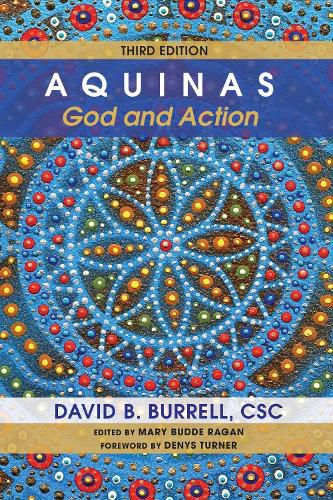Readings Newsletter
Become a Readings Member to make your shopping experience even easier.
Sign in or sign up for free!
You’re not far away from qualifying for FREE standard shipping within Australia
You’ve qualified for FREE standard shipping within Australia
The cart is loading…






This title is printed to order. This book may have been self-published. If so, we cannot guarantee the quality of the content. In the main most books will have gone through the editing process however some may not. We therefore suggest that you be aware of this before ordering this book. If in doubt check either the author or publisher’s details as we are unable to accept any returns unless they are faulty. Please contact us if you have any questions.
This exploration of Thomas Aquinas’s philosophical theology, decidedly unorthodox at the time of its original publication, had the good fortune to be employed extensively–notably at Yale and Cambridge–by my eminent colleagues George Lindbeck and Nicholas Lash. It essayed a non-foundational reading of the Summa Theologiae, unabashedly beholden to Wittgenstein, thereby preparing the way for a postmodern yet thoroughly traditional appreciation of the central role which Aquinas played in adapting Hellenic thought to form the hybrid discipline of philosophical theology. Such a reading proved a welcome alternative to the neo-Thomist attempt to separate philosophy from theology, in an effort to show the wider world that the Catholic faith was based on reason. While this unfortunate divide has been fixed in the departmental structure of Catholic colleges and universities throughout the world, it was effectively undermined by the universally respected expositor of Aquinas, Josef Pieper, who noted that free creation is the hidden element in Aquinas’s philosophy. However propitious it may have appeared to Catholic apologists in the heyday of modernism to sever philosophy from theology, it would have made no more sense to Aquinas than it could have to Anselm or Augustine before him. Ironically enough, a postmodern sensibility presaged by John Henry Newman in his Grammar of Assent finds the neo-Thomist construction of reason unadulterated by faith to be just that–an abstract construction–after Hans-Georg Gadamer succeeded in showing how any inquiry is fiduciary in its inception, and as Alasdair MacIntyre has reminded us that all inquiry is in fact tradition-directed, whatever its ostensible attitude towards tradition. So a non-foundational reading of Aquinas was to prove amenable to current philosophers, as well as more faithful to the thought-world of Aquinas himself.
$9.00 standard shipping within Australia
FREE standard shipping within Australia for orders over $100.00
Express & International shipping calculated at checkout
This title is printed to order. This book may have been self-published. If so, we cannot guarantee the quality of the content. In the main most books will have gone through the editing process however some may not. We therefore suggest that you be aware of this before ordering this book. If in doubt check either the author or publisher’s details as we are unable to accept any returns unless they are faulty. Please contact us if you have any questions.
This exploration of Thomas Aquinas’s philosophical theology, decidedly unorthodox at the time of its original publication, had the good fortune to be employed extensively–notably at Yale and Cambridge–by my eminent colleagues George Lindbeck and Nicholas Lash. It essayed a non-foundational reading of the Summa Theologiae, unabashedly beholden to Wittgenstein, thereby preparing the way for a postmodern yet thoroughly traditional appreciation of the central role which Aquinas played in adapting Hellenic thought to form the hybrid discipline of philosophical theology. Such a reading proved a welcome alternative to the neo-Thomist attempt to separate philosophy from theology, in an effort to show the wider world that the Catholic faith was based on reason. While this unfortunate divide has been fixed in the departmental structure of Catholic colleges and universities throughout the world, it was effectively undermined by the universally respected expositor of Aquinas, Josef Pieper, who noted that free creation is the hidden element in Aquinas’s philosophy. However propitious it may have appeared to Catholic apologists in the heyday of modernism to sever philosophy from theology, it would have made no more sense to Aquinas than it could have to Anselm or Augustine before him. Ironically enough, a postmodern sensibility presaged by John Henry Newman in his Grammar of Assent finds the neo-Thomist construction of reason unadulterated by faith to be just that–an abstract construction–after Hans-Georg Gadamer succeeded in showing how any inquiry is fiduciary in its inception, and as Alasdair MacIntyre has reminded us that all inquiry is in fact tradition-directed, whatever its ostensible attitude towards tradition. So a non-foundational reading of Aquinas was to prove amenable to current philosophers, as well as more faithful to the thought-world of Aquinas himself.